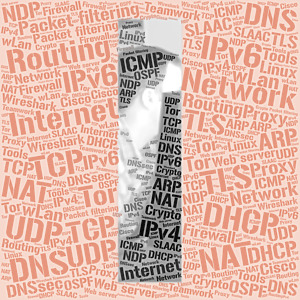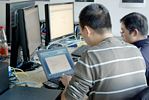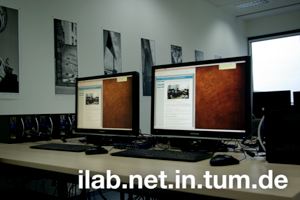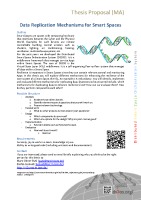iLab — build your own Internet
The iLabs are a very successful teaching series about distributed systems and networking. Together, the iLabs reached far more than 2000 students between 2004 and 2018. The iLabs currently consist of five courses:
- iLab - Build your own Internet (since 2004),
- iLab2 - You set the Focus! (since 2010), and
- iLabX - The virtual Internet Laboratory (since 2018) are lab courses that I designed that run very successfully with more than 2000 participants at different German Universities.
- iLabS - Secure Internet Measurements (since 2018),
- iLabX - The Internet Masterclass (since 2019).
iLab1 - Build your own Internet teaches you how the core protocols and tools that hold the Internet together work.

For infos around the next run at TUM follow this link.
The originally called "Internetlab" was based on the book "Jörg Liebeherr and Magda El Zarki, Mastering Networks: An Internet Lab Manual, Pearson/Addison Wesley, 2004." A course directly based on the book was established by the new networking chair Prof. Dr.-Ing. Georg Carle in cooperation with Gerhard Münz and Uwe Bilger at the University of Tübingen in 2003.
From 2004 on Marc-Oliver Pahl and Uwe Bilger created a new Internetpraktikum with a new set of exercises that suited better for German Universities. At this opportunity, Marc-Oliver transformed the course into one of the first blended learning lab courses in Germany. Marc-Oliver and his changing teams are continuously improving the exercises, the didactical concept and the software supporting it since then.
With the move of the chair to Technical University of Munich (TUM) in 2008 the course was established there by Marc-Oliver Pahl with the strong support of Stephan Günther as "iLab". In 2010 Marc-Oliver established a second iLab course at TUM that provides students with in depth knowledge of selected topics. This course is independent of the iLab and can alternatively be selected by interested Bachelor and Master students. Following up from his 2013 Ernst Otto Fischer teaching prize, Marc-Oliver laid an additional focus is on teaching students how to teach networking topics. More recently Benjamin Hof and Lukas Schwaighofer did invaluable contributions to improving the content and the workflows and the technical base of the iLabs.
Since 2004 Marc-Oliver is continuously improving and extending the teaching concept and content with dedicated colleagues including Benjamin Hof, Lukas Schwaighofer, Uwe Bilger, Stephan Günther, and Florian Wohlfart. A core concept of the iLab teaching methodology is constant improvement and renewal of the content. This ensures that the iLabs continuously teach up-to-date knowledge to students.
Since 2003 about 1500 students were educated in computer networks and distributed systems via the iLabs. From the beginning the student feedback is extremely positive. A typical remark is that the course is very time and labor intense for the 10 ECTS it is valued. However, the revenue in acquiring knowledge and having fun doing so would compensate that very well.
A survey of students that participated in the iLab and had finished their University studies years ago resulted in multiple feedbacks that the iLab content would still be remembered and that it would be very well applicable in the daily industry work. This shows how how suitable the topic selection is and how well the teaching methodology works.
Original Topics

The course covers the basics of computer networks on a bachelor level (10 ECTS).
You can find our current course portal at the Technische Universität München here.
The topics are:
- The Basics — Cabling and getting familiar with basic tools
- Static Routing — Exploring static routing
- Dynamic Routing — Exploring dynamic Routing with RIP, OSPF and some basics of BGP
- TCP/ UDP — Watching the packets travel on the transport layer (congestion control, etc.)
- DNS — Setting up a DNS server and exploring some details of the DNS
- NAT/ DHCP/ IPv6 — Specialties behind a NAT, auto configuration, what is different in IPv6 compared to IPv4
- Security I (Firewall, SSL) — Setting up a HTTP server with SSL and mainly configuring an iptables firewall
- Security II (VPN) — Virtual private networks with IPSec
- Wireless LAN (WEP, WPA, Radius) — Exploring the mechanisms of wireless LANs with a focus on security
- Multicast — Sending data from one source to multiple receivers
Universities where the course is currently running
The course is currently running at the Technische Universität München, the Universität Tübingen and in parts at the Albstadt-Sigmaringen University.
As part of the European Commission's Tempus IV program "Modernization of Master Program Networks and Communication - MoNetCom" the exercise will probably be established at some of the partner universities in Tomsk, Moscow, Irkutsk, Barcelona and Lissabon.

The ilab laboratory in Munich.
Credits
A lot of people did very valuable contributions to the exercise.
First of all there is Uwe Bilger. We did the first steps for the exercise you hold in your hands right now in 2004. Without Uwe none of this would exist. With his experience and his dedication he planted the seed that is still growing.
Another participant from the start was Heiko Niedermayer. Heiko mainly provided material for the prelabs and later for the lecture. Johannes Riedl joined Uwe and me in 2004 to create some of the exercises. Without his help we would never have been able to survive in the just-in-time exercise production we had in the summer term 2004. In summer term 2005 Andreas Korsten helped entirely rewriting the firewall lab which turned from "partly useful" into "excellent" through him. The next who joined the boat was Joachim Schiele. Joachim is the person that dedicated most of the time to the lab besides Uwe and me. He worked from 2005 to 2009 as a tutor. He was a huge help to all the participants during this time. Joachim also was the initial creator of the Wireless LAN exercise which is very attractive to the students. He also improved the TCP-exercises later. Then Jakob Dettner and Tobias Beck joined. Besides being tutors they helped me creating the IPv6 parts and revising several other things in the exercises.
After my change to Munich in 2008, I continued working on the exercise there but first of all I had to establish the exercise there. Without Stephan Günther this would never have been possible. Stephan brought so much experience and enthusiasm with him that the almost impossible became possible: we got from zero to operatable in only three month! He created a phantastic lab infrastructure that can perfectly handle the more than 30 students we had from the beginning. Besides working as a tutor and sharing his wisdom with the participants Stephan also laid hand on different exercises. He took Joachims input and renewed the TCP lab part. He also spent a lot of time with the Wireless LAN lab to make it running in Munich and produce even better results. Next Rene Brogatzki joined as a tutor. As he was also highly motivated from being student in the past semester, he and Stephan added a totally new lab at the beginning making those students that never used Linux familiar with its basics. This consequently follows the concept of providing the best way possible the information to the participants they need to help themselves. Rene lately added DNS-Sec to the DNS lab supported by Stephan. Mislav Boras and Enrique Garcia renewed most of the graphics in 2010 and were of major help creating a "textbook" to the exercise.
During the last semesters Martin Veith was an important part to the success of the exercise as a tutor. So were Gürcan Karakoc and Corinna Schmitt. As staff members Heiko Niedermayer, Marc Fouquet, Holger Kinkelin and Andreas Müller, and lately Florian Wohlfart, and Benjamin Hof help in Munich to provide an excellent exercise to students.
In Tübingen Dirk Haage and Ralph Holz were running the exercise before they changed to Munich. Then, the team around Dr. Christian Hoene was keeping the Internetpraktikum alive there. Now Prof. Michael Menth is running it as part of his curriculum.
A big "thank you" to all the students participating in the exercise. Only their explicit and implicit feedback made it possible to make the exercise what it is today: Never stop criticising constructively :)
Special thanks to Prof. Dr.-Ing. Georg Carle for continuously supporting my efforts in this project.
